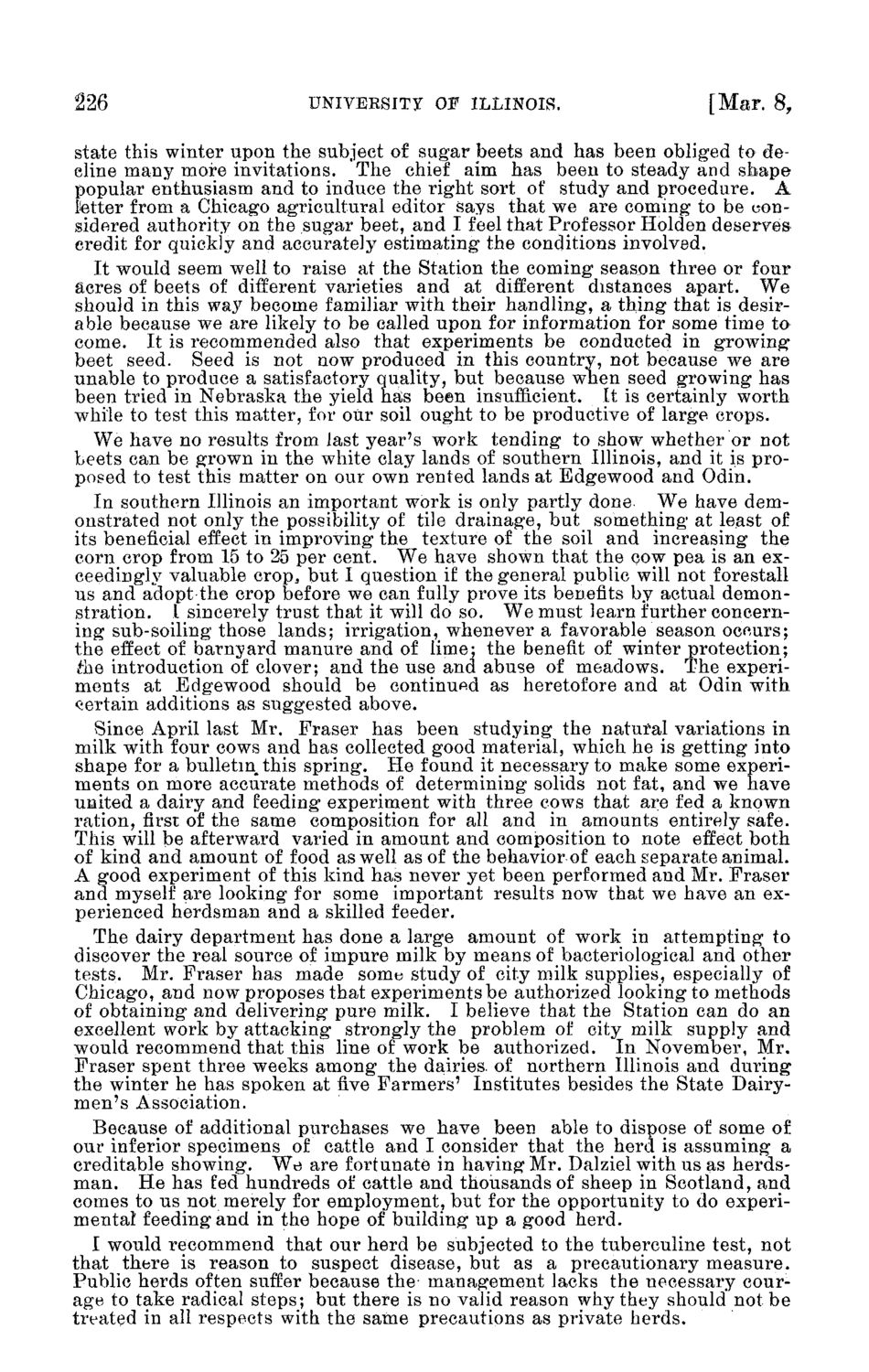| |
| |
Caption: Board of Trustees Minutes - 1898
This is a reduced-resolution page image for fast online browsing.

EXTRACTED TEXT FROM PAGE:
226 UNIVERSITY OF ILLINOIS. [Mar. 8, state this winter upon the subject of sugar beets and has been obliged to decline many more invitations. The chief aim has been to steady and shape popular enthusiasm and to induce the right sort of study and procedure. A letter from a Chicago agricultural editor says that we are coming to be considered authority on the sugar beet, and I feel that Professor Holden deserves credit for quickly and accurately estimating the conditions involved. It would seem well to raise at the Station the coming season three or four acres of beets of different varieties and at different distances apart. We should in this way become familiar with their handling, a thing that is desirable because we are likely to be called upon for information for some time to come. It is recommended also that experiments be conducted in growing beet seed. Seed is not now produced in this country, not because we are unable to produce a satisfactory quality, but because when seed growing has been tried in Nebraska the yield has been insufficient. It is certainly worth while to test this matter, for our soil ought to be productive of large crops. We have no results from last year's work tending to show whether or not beets can be grown in the white clay lands of southern Illinois, and it is proposed to test this matter on our own rented lands at Edgewood and Odin. In southern Illinois an important work is only partly done. We have demonstrated not only the possibility of tile drainage, but something at least of its beneficial effect in improving the texture of the soil and increasing the corn crop from 15 to 25 per cent. We have shown that the cow pea is an exceedingly valuable crop, but I question if the general public will not forestall us and adopt the crop before we can fully prove its benefits by actual demonstration. 1 sincerely trust that it will do so. We must learn further concerning sub-soiling those lands; irrigation, whenever a favorable season occurs; the effect of barnyard manure and of lime; the benefit of winter protection; the introduction of clover; and the use and abuse of meadows. The experiments at EdgewTood should be continued as heretofore and at Odin with certain additions as suggested above. Since April last Mr. Fraser has been studying the natural variations in milk with four cows and has collected good material, which he is getting into shape for a bulletin, this spring. He found it necessary to make some experiments on more accurate methods of determining solids not fat, and we have united a dairy and feeding experiment with three cows that are fed a known ration, first of the same composition for all and in amounts entirely safe. This will be afterward varied in amount and composition to note effect both of kind and amount of food as well as of the behavior of each separate animal. A good experiment of this kind has never yet been performed and Mr. Fraser and myself are looking for some important results now that we have an experienced herdsman and a skilled feeder. The dairy department has done a large amount of work in attempting to discover the real source of impure milk by means of bacteriological and other tests. Mr. Fraser has made somu study of city milk supplies, especially of Chicago, and now proposes that experiments be authorized looking to methods of obtaining and delivering pure milk. I believe that the Station can do an excellent work by attacking strongly the problem of city milk supply and would recommend that this line of work be authorized. In November, Mr. Fraser spent three weeks among the dairies, of northern Illinois and during the winter he has spoken at five Farmers' Institutes besides the State Dairymen's Association. Because of additional purchases we have been able to dispose of some of our inferior specimens of cattle and I consider that the herd is assuming a creditable showing. We are fortunate in having Mr. Dalziel with us as herdsman. He has fed hundreds of cattle and thousands of sheep in Scotland, and comes to us not merely for employment, but for the opportunity to do experimental feeding and in the hope of building up a good herd. I would recommend that our herd be subjected to the tuberculine test, not that there is reason to suspect disease, but as a precautionary measure. Public herds often suffer because the- management lacks the necessary courage to take radical steps; but there is no valid reason why they should not be treated in all respects with the same precautions as private herds.
| |